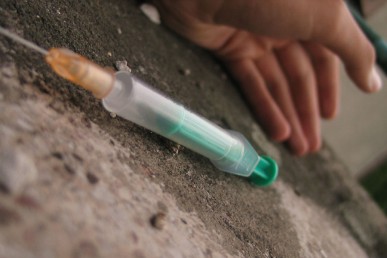Reducing deaths from opioid overdoses in Illinois
A University of Illinois at Chicago researcher says most overdoses and opioid-related overdose deaths in Illinois are now caused by heroin use, often in combination with potent synthetic opioids, such as fentanyl and carfentanyl.

“Addiction is by no means bounded by socioeconomic status or race,” says James Swartz, an associate professor in the Jane Addams College of Social Work.
James Swartz, an associate professor in the Jane Addams College of Social Work, is working with the Illinois Department of Human Services to gain a better understanding of the opioid crisis in Illinois with the aim of reducing deaths from overdoses.
“In states such as Tennessee or Ohio, it’s been more predominantly a problem of prescription opioids,” Swartz says. “But looking at the data in Illinois, it appears to be increasingly heroin/fentanyl.”
The Illinois Department of Human Services estimates that 1,826 people died in 2016 from opioid-related overdoses. This represents an increase of more than 70 percent compared to 2013. The opioid crisis is a growing problem throughout the state and across the nation, but the addiction can follow different pathways in different areas.
To combat this growing problem, Swartz has been working with the department’s Division of Alcoholism and Substance Abuse on two aspects of the opioid epidemic in Illinois: reducing the number of deaths from overdoses and gaining a better understanding of the epidemiology of addiction in Illinois.
For the last year, Swartz has been working on a project called “Illinois Prevent Prescription Drug/Opioid Overdose Deaths.” In six Illinois counties known to have high numbers of opioid-related overdoses — Cook, DuPage, Lake, Madison, St. Clair and Will counties — the project has increased the availability of naloxone reversal kits, as well as training in their use.
Swartz will analyze data collected from each site to determine best practices. “Each site is almost like a unique laboratory, and we’ll be doing a careful examination of the data to see what practices are most effective for reducing overdoses and overdose-related deaths as well as use of opiates,” he said.
To help achieve that goal, Swartz will collaborate with the UIC Center for Clinical & Translational Sciences to create an Internet-based app that can be accessed on computers or mobile devices to capture information about naloxone administration from first responders and bystanders in the field.
The project is being conducted under a five-year federal grant from the Substance Abuse and Mental Health Services Administration/Center for Substance Abuse Prevention, administered in Illinois by the Division of Alcoholism and Substance Abuse.
Swartz is also conducting an epidemiological analysis of data from a variety of sources. “I’m trying to collect data from as many sources as I can to help us understand how the State of Illinois can best direct its resources to reduce opioid overdoses and use,” he said. “For example, the state has epidemiological data on the general population, but it has never been examined side-by-side with data from the criminal justice system, for people screened as they enter prison. We’ve also never looked at veterans, and we really don’t have comprehensive data for the LGBTQ community.”
Socioeconomic factors may also affect a person’s propensity for use and addiction. “Many of our poorest neighborhoods in Chicago and in other parts of the state, often disproportionately composed of racial and ethnic minorities, have been especially hard hit by this epidemic,” Swartz said.
Creasie Finney Hairston, dean of the Jane Addams College of Social Work, added, “The lives of so many people are being devastated by the opioid crisis, often in communities where access to health services is very limited. Only through community well-being and health equity will we achieve social justice.”
As a premier institution for graduate study, the Jane Addams College of Social Work is a recognized leader in social work research, education and service.
